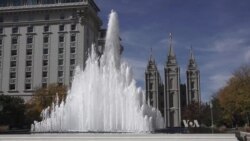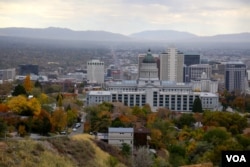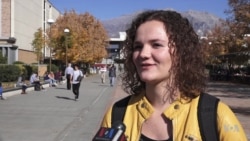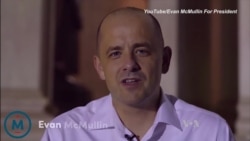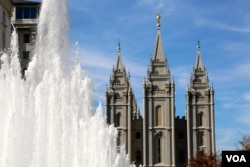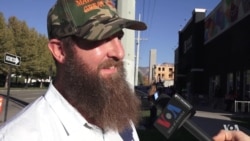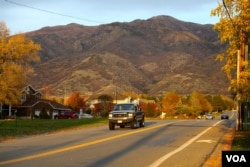Travis Thurston is not Muslim. But he remembers exactly where he was when he first heard Republican presidential candidate Donald Trump propose a ban on Muslim immigration to the United States.
“I was in the car with my family, and we were traveling up to go on a family trip, just listening to the radio,” recalls the 32-year-old father of three, who like the majority of those in the solidly conservative state of Utah is a member of the Mormon faith.
Like many in the Church of Jesus Christ of Latter-day Saints, Thurston was already reluctant to support Trump because of his bombastic personality and history of making lewd comments about women.
But as he heard excerpts of Trump calling for a “total and complete shutdown” of Muslim immigration, Thurston realized that he wouldn’t ever be able to vote for the Republican presidential candidate.
“It made us kind of pause and reflect,” said Thurston, hesitating as his voice begins to break. “It’s actually kind of an emotional thing for me to talk about. Because when I hear about banning Muslims … that very easily could be me.”
That strong emotional reaction against Trump is not uncommon among LDS members, many of whom trace their lineage directly to the mid-1800s, when the earliest Mormons were driven across the plains, partly as a result of fierce anti-Mormon discrimination.
That history helps explain why Trump is struggling to win the state of Utah, which has voted for the Republican presidential nominee in every election since 1964.
Recent Utah polls show a highly competitive three-way race among Trump, Democratic presidential nominee Hillary Clinton and independent candidate Evan McMullin, a latecomer to the race whose traditional conservatism and Utah roots are appealing to many in the state.
GOP loss unprecedented
It’s difficult to convey just how unprecedented a Trump loss in Utah would be, and how much it could influence the outcome of the election.
Clinton currently has at least a slight lead over Trump in most national polls, but the race appears to be a tossup in several key battleground states that often decide the election.
Utah is not usually one of those states. Republican victory here has been counted on, making a defeat devastating to Trump’s presidential chances.
WATCH: BYU Students Describe Their Dissatisfaction With Election Choices
“If he can’t win Utah, he can’t pull it off,” conceded Republican political consultant Reed Galen, who lives near Utah’s capital, Salt Lake City.
‘Trump tape’ effect
Until recently, Trump had been comfortably ahead in most Utah polls, coming in with mid- to high 30 percent support.
But that changed last month, after a leaked 2005 video showed the Republican presidential nominee bragging about being able to grab women’s genitals and get away with it because he is famous.
Within hours of the tape’s release, dozens of Republicans issued statements distancing themselves from Trump. Nowhere was the backlash quicker or more decisive than in Utah, where top lawmakers across the state slammed the GOP nominee.
“Donald Trump’s statements are beyond offensive & despicable,” tweeted Utah Governor Gary Herbert, a Mormon who is running for re-election.
Though the LDS church itself does not endorse candidates, the church-owned Deseret News immediately published a scathing editorial calling for Trump to resign as nominee, saying that evil “oozes” from his comments.
The tape was a last straw for many Mormon voters, according to Quin Monson, a political scientist at Brigham Young University.
“I think within the space of about 24 hours, a majority of the state was suddenly aware that this guy is beyond the pale,” Monson said. “And you just saw his numbers tumble.”
To many Mormon voters, Trump had become “the antithesis of the sort of nice, well-mannered Mormon you could imagine living next door to you,” Monson said.
Watch: An Independent Candidate Aims for a Political Movement
McMullin emerges
Many of Trump’s supporters fled to McMullin, a Mormon and a BYU graduate who announced his candidacy only in August.
McMullin’s penny-pinching, last-minute campaign has relied largely on free media coverage, as well as word of mouth. It’s a strategy that’s led to quick results, in part because of the unique 2016 campaign developments but also because of the civic mindedness of the LDS community, Monson said.
“Think of the typical Mormon missionary that you see in a white shirt and tie, bicycling around,” he said. “They knock doors and talk to strangers. This is like the perfect training ground for political activism, if you want to think of it that way.”
Not just Mormons
But McMullin is focused on winning over more than just Mormon voters.
Speaking to VOA from his campaign headquarters in Salt Lake City, McMullin pointed to recent polls showing him gaining support in states across the country, insisting it’s not just Mormons upset at Trump’s proposals, such as the Muslim ban, which he says is bigoted.
“The reason why it offends Mormons is because we experienced some religious persecution years and years ago. But it offends a lot of people in this country, not just Mormons,” McMullin said.
McMullin doesn’t shy away from talking about his faith, but it's clear that he’s not eager to discuss it at length, either.
"People are very focused on the Mormon question now, and I understand that. But I’m trying to push back a bit because I don’t think these values are uniquely Mormon,” he said. “They’re also shared by so many other Americans and by so many other people around the world. They are just fundamental truths.”
McMullin’s chances of winning the presidency are infinitesimal. He is on the ballot in only 11 states. Everywhere else, his name must be written in, and in some cases state laws may prohibit such write-in votes from counting.
Trump pushes back
But he is very much a threat in Utah.
During a Saturday interview on Fox News, Trump lashed out at McMullin for the first time, complaining that the independent Mormon candidate was “going from coffee shop to coffee shop” to win Utah votes (a questionable assertion, since LDS teaching forbids drinking coffee).
The Trump campaign was forced to send its top surrogate, vice presidential nominee Mike Pence, to Utah last week for a rally, an extraordinary step, just days ahead of the November 8 vote.
WATCH: Utah Voters Express Dissatisfaction With McMullin, Clinton
The rally, which attracted about 1,000 people to an events center in downtown Salt Lake City, was one of Pence’s most spirited and well-attended events all year. Many attendees made it clear they felt no obligation to support McMullin.
“Yeah, he’s Mormon, OK,” said Jared Pierce, a sales and marketing specialist from Draper, Utah, who attended the Pence rally. “I don’t think that should play a big part in it. It’s naive to think that’s important.”
Like many other Trump supporters at the rally, Pierce said he didn’t know enough about McMullin, and he chastised him for entering the race at such a late stage, a move he said was meant to “circumvent the process.”
“I know more about Hillary Clinton’s emails than I do about him,” he joked.
Other than the Pence rally, the Trump campaign appears to have spent few resources on winning Utah.
Mark Greer, a Trump campaign volunteer who runs the Utah for Donald Trump Facebook page, told VOA that as far as he knew, paid campaign officials “have pretty much pulled up and ran off to Michigan and left me in charge.”
“I got the keys to the downtown office and everything. There’s nobody in there. There’s no organized effort anymore,” he said.
Still, Greer is optimistic about Trump's chances. “I think he’s going to do fine," Greer said.




